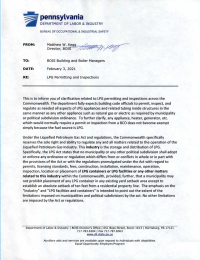How exactly can this be misinterpreted when it comes directly from PA L&I?
DIRECTLY FROM PA L&I
Any LPG requirements are superseded by the requirements of Pennsylvania’s Propane and Liquefied Petroleum Gas Act (and regulations). This Act and regulations are limited to LPG Facility which is defined as Distributors, Bulk Plants, and Industrial Users. The department fully expects building code officials to permit, inspect, and regulate as needed all aspects of LPG appliances and related tubing inside structures in the same manner as any other appliance such as natural gas or electric as required by municipality or political subdivision ordinance. To further clarify, any appliance, heater, generator, etc., which would normally require a permit or inspection from a BCO, does not become exempt simply because the fuel source is LPG.
Maybe your 2 bosses and 3 BCOs need it drawin on construction paper with colorful crayons.

